News
Nurses Pretend to Die During Ebola Protest in Las Vegas

Dressed in hazmat costumes and red shirts, roughly 1,000 nurses gathered on the Las Vegas strip to call attention to the United States' level of preparedness in fighting a potential Ebola crisis at home.
The so-called "die-in" demonstrators, organized by nurses in Vegas for the Planet Nurse convention, said they don't believe U.S. hospitals could handle an Ebola outbreak.
The protesters marched through the Planet Hollywood casino and dropped to the ground in front of the Bellagio, pretending to be dead. Once on the ground, they outlined their bodies in chalk like a crime scene and wrote out the hashtag #StopEbolaRNRN.
The criticism comes after a top federal health official told a Senate committee last week that the deadly virus, which has struck African nations could eventually come to the states, according to Politico.
A study published earlier this month in scientific journal PLOS Currents, listed the top 16 countries at risk of being impacted by Ebola, including the United Kingdom, the U.S., Germany, and several African countries, such as Ghana and Nigeria. Ghana, the UK and Gambia had the greatest probability of seeing Ebola cases.
The nurses wore hazmat suits and red shirts.
By the end of the month, there could be up to 21,000 reported and unreported cases of the virus in Liberia and Sierra Leone, according to a Centers for Disease Control report released Tuesday. That estimate could jump up to 1.4 million by January.
"It's not acceptable that these people are dying," RoseAnn DeMoro, executive director of National Nurses United, told her fellow protestors, who also carried out a moment of silence for international health workers who have died while caring for Ebola patients in West Africa.
Meanwhile, President Barack Obama said Wednesday at the United Nations that the U.S. is sending medical teams to contain the outbreak, but more can be done.
Despite the nurses' concerns, Roslyne Schulman, policy director for the American Hospital Association, said members are prepared to "handle a broad range of infectious diseases" and have been encouraged to follow the federal Centers for Disease Control's recommendations for how to respond to the Ebola virus.
"When there is a potential risk for particular infections in communities — such as Ebola — hospitals alert their clinical staff to increase surveillance for symptoms and risk factors associated with the specific disease," she said in an emailed statement.
American airport officials, including those at John F. Kennedy Airport in New York, have also been on the lookout for infected fliers. Twenty entry locations in the U.S. have been manned with quarantine stations, according to CBS and the CDC in July advised travelers to avoid the West African countries of Guinea, Liberia, and Sierra Leone, which have been hard hit by the Ebola outbreak.
Some airports have also been taking precautions. Airport staff in Guinea, Sierra Leone and Liberia have been taking passengers' temperatures with thermometers, according to NPR. The airport in Pune, India, is using a thermal scanner to detect Ebola symptoms, according to The Times of India. The Pune airport also has a special screening counter located before immigration counters where medical professionals check all passengers.